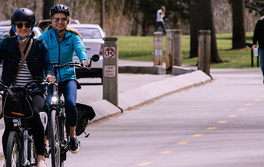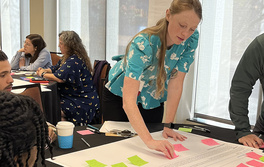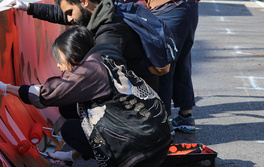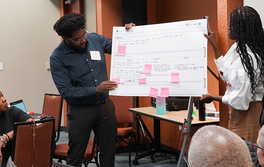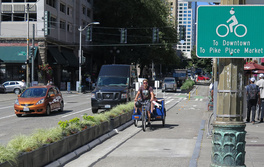
STATEMENT: To Meet Climate & Equity Goals, U.S. Congress Must Pass Build Back Better Act with Essential Transportation Provisions
The following is a statement from Harriet Tregoning, director of NUMO, the New Urban Mobility alliance, on the Build Back Better Act, also known as the United States federal budget reconciliation bill.
As the September 30th deadline for U.S. surface transportation reauthorization looms, Congress is racing to pass the Infrastructure Investment and Jobs Act (also known as the Senate infrastructure deal) while also moving to pass the Build Back Better Act.
The Infrastructure Investment and Jobs Act represents an historic level of investment in our national infrastructure, but it doesn’t go far enough to meet the urgent needs of this moment and ensure a shift toward a more equitable and sustainable transportation system that connects all Americans to economic opportunity and daily needs. That’s why we need the Build Back Better Act to allocate funding for programs that are essential to improve mobility access, address the climate crisis and work toward environmental and climate justice. In addition to passing the Infrastructure Investment and Jobs Act, Congress must also pass the Build Back Better Act with the following House-drafted initiatives included:
- The Affordable Housing Access Program provides $10 billion to support access to affordable housing and enhance mobility to expand access to job and educational opportunities and community services for low-income households and residents of communities that have been historically underserved. Funds will support the establishment of new transit routes, the expansion of service areas, improved frequency on existing routes, the provision of fare-free and reduced-fare transit service, state of good repair for transit facilities, research and workforce activities, route planning and projects to improve accessibility.
- Community Climate Incentive Grants to reduce surface transportation-related greenhouse gas (GHG) emissions, including funds for the Federal Highway Administration to take steps to ensure the reduction of on-road GHG emissions, including establishing a GHG performance measure and creating incentives for states that demonstrate significant carbon reductions.
- Neighborhood Access and Equity Grants to address neighborhood equity, safety and affordable transportation access, including investment for competitive grants administered by the Federal Highway Administration to reconnect communities divided by infrastructure barriers, mitigate negative impacts of transportation projects on underserved communities and support equitable transportation planning and community engagement activities.
- Local Transportation Priorities funding to advance local surface transportation projects.
- Reinstating and expanding employer-provided fringe benefits for bicycle commuting
- Establishing a credit for certain new electric bicycles to expand access to electric micromobility.
- The Electric Vehicle Charging Equity Program, which would create a federal program to provide technical assistance and award grants for projects that increase deployment of and accessibility to electric vehicles in underserved communities.
- Environmental and Climate Justice Block Grants for community-led initiatives in underserved communities and to build community capacity building centers to address disproportionate environmental and public health harms related to pollution and climate change.
NUMO looks forward to working with the Biden-Harris administration and Congress to ensure that we meet the urgent needs of this moment to decarbonize U.S. transportation and create a more equitable and sustainable transportation system for all.
Please direct media inquiries to Madlyn McAuliffe at madlyn@numo.global.
NUMO, the New Urban Mobility alliance, is a global organization that channels tech-based disruptions in urban transport to create joyful cities where sustainable and just mobility is the new normal. Founded in 2019 as an outgrowth of the Shared Mobility Principles for Livable Cities, NUMO convenes diverse allies and leverages the momentum of significant revolutions in mobility to target urban issues — including equity, sustainability, accessibility and labor — impacted by the shifting transportation landscape. NUMO is hosted by WRI Ross Center for Sustainable Cities.
Header image: Patrick Müller / Flickr
